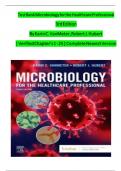Test Bank Microbiology for the Healthcare Professional
ll ll ll ll ll ll
3rd Edition ll
By Karin C. VanMeter, Robert J. Hubert
ll ll ll ll ll ll ll
| Verified Chapter's 1 - 25 | Complete Newest Version
ll ll ll ll ll ll ll ll ll
,Table of content ll ll
1. Scope of microbiology
ll ll ll ll
2. Chemistry of life
ll ll ll ll
3. Cell structure and function
ll ll ll ll ll
4. Bacteria and archaea
ll ll ll ll
5. Viruses
ll ll
6. Eukaryotic microorganisms
ll ll ll
7. Physical and chemical methods of control
ll ll ll ll ll ll ll
8. Microbiological laboratory techniques
ll ll ll ll
9. Microbiological laboratory safety issues
ll ll ll ll ll
10. Pharmacology
ll ll
11. Antimicrobial drugs
ll ll ll
12. Infection and disease
ll ll ll ll
13. The immune response and lymphatic system
ll ll ll ll ll ll ll
14. Infections of the integumentary system, soft tissue, and musculoskeletal system
ll ll ll ll ll ll ll ll ll ll ll
15. Infections of the respiratory system
ll ll ll ll ll ll
16. Infections of the gastrointestinal system
ll ll ll ll ll ll
ll 17. Infections of the nervous system and sensory structures
ll ll ll ll ll ll ll ll ll
ll 18. Infections of the cardiovascular and circulatory systems
ll ll ll ll ll ll ll ll
ll 19. Infections of the urinary system
ll ll ll ll ll ll
20. Infections of the reproductive system
ll ll ll ll ll ll
ll 21. Sexually transmitted infections and diseases
ll ll ll ll ll ll
22. Human age and microorganisms
ll ll ll ll ll
ll 23. Microorganisms in the environment and effects on human health
ll ll ll ll ll ll ll ll ll ll
24. Emerging infectious diseases
ll ll ll ll
25. Biotechnology
ll ll
,Chapter 01: Scope of Microbiology
ll ll ll ll
VanMeter: Microbiology for the Healthcare Professional, 3rd Edition
ll ll ll ll ll ll ll
MULTIPLE CHOICE ll
1. In the sixteenth century a father-and-son team, by the name of
ll ll , produced ll ll ll ll ll ll ll ll l
acompound microscope consisting of a simple tube with lenses at each end.
l l ll ll ll ll ll ll ll ll ll ll ll
a. van Leeuwenhoek ll
b. Semmelweis
c. Janssen
d. Hooke
ANS: l l C REF: p. 3 l l ll
2. “Animalcules” were first described by ll ll ll ll
a. Robert Hooke. ll
b. Antony van Leeuwenhoek. ll ll
c. Hans Janssen. ll
d. John Needham. ll
ANS: l l B REF: p. 3 l l ll
3. Micrographia, a publication illustrating insects, sponges, as well as plant cells, was publishedby ll ll ll ll ll ll ll ll ll ll ll ll l
a. Robert Hooke. ll
b. Antony van Leeuwenhoek. ll ll
c. Hans Janssen. ll
d. John Needham. ll
ANS: l l A REF: p. 3 l l ll
4. Low-power microscopes designed for observing fairly large objects such as insects or
ll ll ll ll ll ll ll ll ll ll ll
wormsare
ll l
a. electron microscopes. ll
b. dark-field microscopes. ll
c. fluorescence microscopes. l
d. stereomicroscopes.
ANS: l l D REF: p. 5 l l ll
5. A microscope that provides a three-dimensional image of a specimen is a
ll ll ll ll ll ll ll ll ll ll ll
a. dark-field microscope. ll
b. transmission electron microscope. ll ll
c. bright-field microscope. ll
d. scanning electron microscope. ll ll
ANS: l l D REF: p. 7 l l ll
6. The tool of choice to observe living microorganisms is the
ll ll ll ll ll ll ll ll ll
a. bright-field microscope. ll
b. phase-contrast microscope. ll
, c. fluorescencemicroscope. l
d. electron microscope. ll
ANS: l l B REF: p. 6 l l ll
7. Which scientist is most responsible for ending the controversy about spontaneous generation?
ll ll ll ll ll ll ll ll ll ll ll
a. John Needham ll
b. Joseph Lister ll
c. Louis Pasteur ll
d. Robert Koch ll
ANS: l l C REF: p. 8 l l ll
8. Fossils of prokaryotes go back ll ll ll ll billion years. ll
a. 4.0 to 5.0 ll ll
b. 3.5 to 4.0
ll ll l l ll ll
c. 2.5 to 3.0 ll ll
d. 2.2 to 2.7
ll ll l l ll ll
ANS: l l B REF: p. 9 l l ll
9. Molds belong to which of the following groups of eukaryotic organisms?
ll ll ll ll ll ll ll ll ll ll
a. Protozoans
b. Archaea
c. Fungi
d. Algae
ANS: l l C REF: l l p. 11
ll
10. The correct descending order of taxonomic categories is
ll ll ll ll ll ll ll
a. species, domain, phylum, kingdom, order, division, class, genus. ll ll ll ll ll ll ll
b. domain, kingdom, phylum, class, family, order, genus, species. ll ll ll ll ll ll ll
c. domain, kingdom, phylum, class, order, family, genus, species. ll ll ll ll ll ll ll
d. kingdom, domain, phylum, order, class, family, genus, species. ll ll ll ll ll ll ll
ANS: l l C REF: l l p. 10
ll
11. Complex communities of microorganisms on surfaces are called
ll ll ll ll ll ll ll
a. colonies.
b. biofilms.
c. biospheres.
d. flora.
ANS: l l B REF: l l p. 12
ll
12. A relationship between organisms in which the waste product of one provides nutrients
ll ll ll ll ll ll ll ll ll ll ll ll
foranother is called
ll l ll ll
a. mutualism.
b. competition.
c. synergism.
d. commensalism.
ANS: l l D REF: l l p. 12
ll




